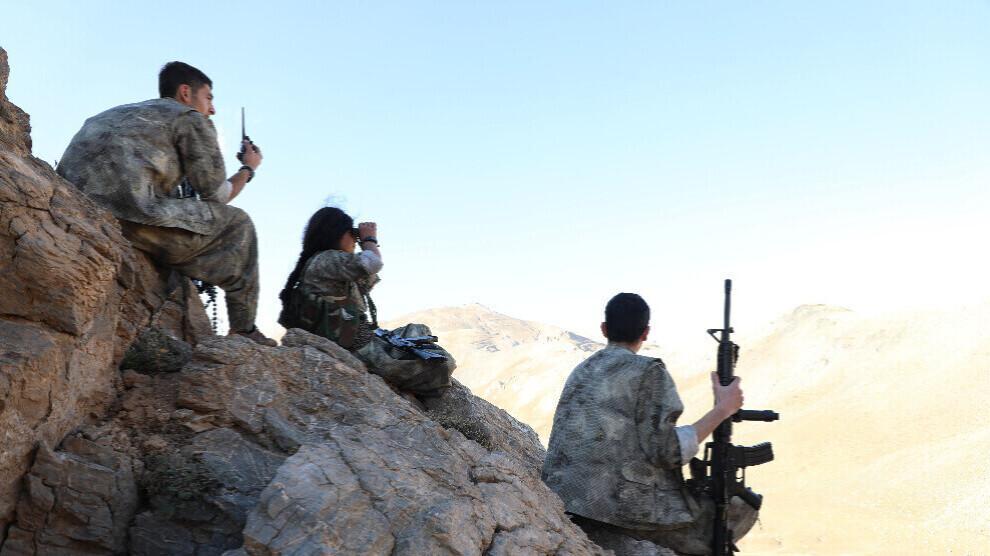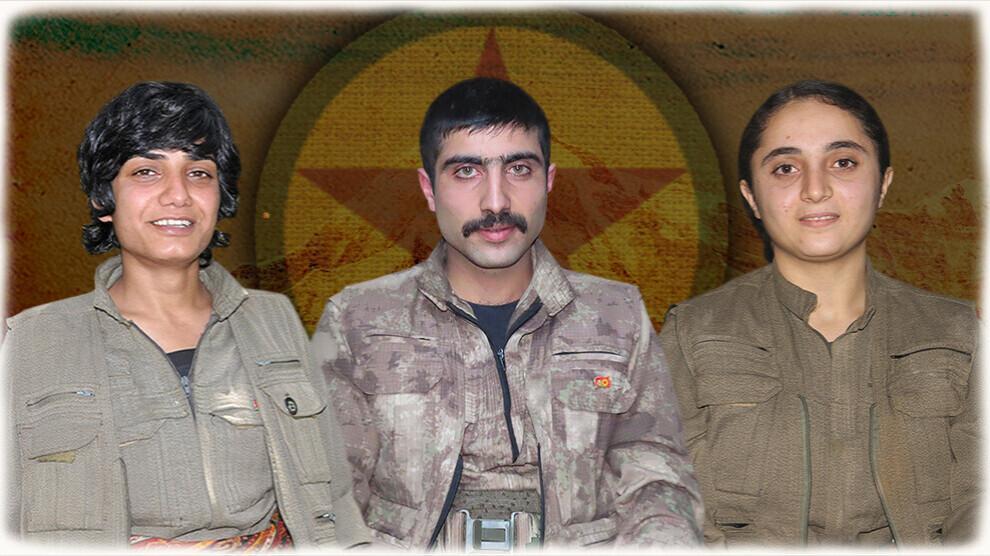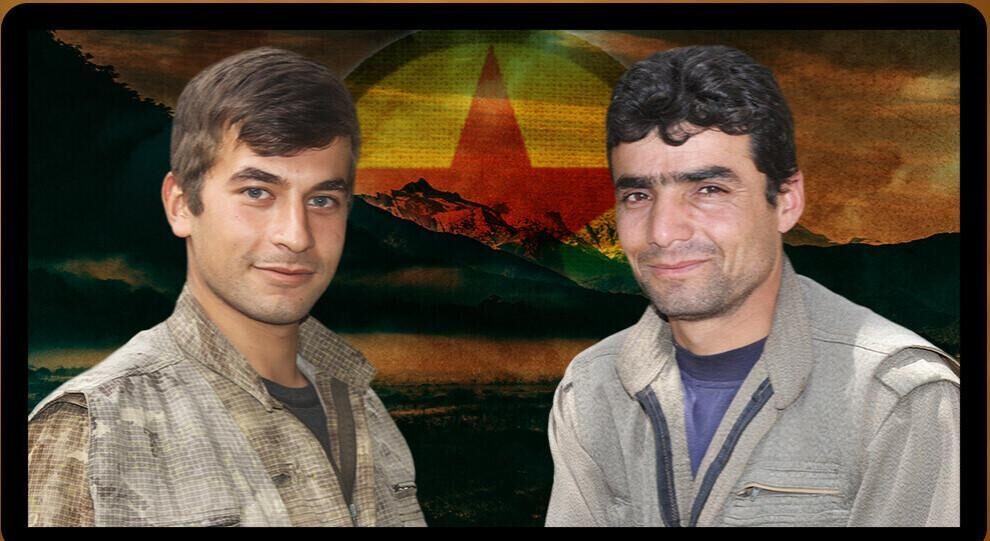
A Turkish soldier was shot dead by an HPG guerrilla on the western front of the Zap region. According to the press office of the People’s Defense Forces (HPG), the action took place on Sunday in the Girê Bahar resistance area. At about the same time and the following day, fighters also struck against occupation troops in Girê Amêdî. There, heavy weapons were used against soldiers in open terrain as part of three different actions.
Guerrilla sabotage in Girê FM
In the area around Girê FM, which is also in the western section of the Zap region, guerrilla units carried out a sabotage action on Tuesday morning. According to the HPG, the action was directed against an attempted advance by the occupation troops and led to the halt of military movements. Soldiers in Girê Şehîd Hêmin near Xakurke were targeted with heavy weapons at about the same time.
Helicopter attacked over Metîna
The guerrillas also took action against the Turkish army in Metîna. There, several combat helicopters were fired upon and forced to turn around after a wave of attacks on the resistance area of Dergelê. According to the HPG, the action took place late on Sunday evening. In addition to Dergelê, the nearby areas of Golka and Serê Metîna as well as Girê Şekîf and Şehîd Şerîf in Xakurke were also attacked by combat helicopters on the same evening.
Attacks by the Turkish army
The Turkish army carried out further attacks in South Kurdistan with combat aircraft. According to the report, the HPG recorded at least 13 air strikes between 15 and 17 September. Areas in Xakurke, Gare, Metîna and Zap were hit. In addition, the HPG reported two attacks with prohibited explosives last night on tunnel systems in Girê FM.

In other news, guerrillas Asrîn Bawer, Xwînda Çiya and Rustem Serhed were killed in August in attacks by the Turkish army on the Xakurke region of South Kurdistan. The Press Center of the People’s Defense Forces (HPG) said that “Asrîn and Xwînda fell as militants of the ‘Jin Jiyan Azadî’ philosophy, while Bawer was active in the Kurdish freedom movement in Europe for years before joining the guerrillas.”
The HPG added: “We express our condolences to the precious families of Asrîn, Xwînda and Rustem as well as to the Kurdish people and reaffirm our promise to keep the memory of our martyrs alive in the free Kurdistan they long for.”
The following information was provided regarding the identities of the fallen.
Code name: Asrîn Bawer
First and last name: Sevda Topçu
Place of birth: Riha
Names of mother and father: Ayhan – Şehmus
Date and place of death: August 4, 2024 / Xakurkê
Code name: Xwînda Çiya
First and last name: Necla Ahmed Silêman
Place of birth: Dêrika Hemko
Names of mother and father: Zeynep – Ahmed
Date and place of death: August 4, 2024 / Xakurkê
Code name: Rustem Serhed
First and last name: Şahin Pekür
Place of birth: Îdir
Names of mother and father: Gulçin – Salih
Date and place of death: August 24, 2024 / Xakurkê
Asrîn Bawer
Asrîn Bawer was born in Urfa (Riha-Wêranşar) and grew up in an environment close to the PKK. Her family later moved to Mersin, but held on to their Kurdish identity. In her youth, Asrîn questioned the role of women in society and studied Abdullah Öcalan’s ideas about a free life.
In 2014, she went to the mountains and joined the freedom struggle. Because she made this decision primarily for emotional reasons, adapting to guerrilla life was not always easy for her at first.
The time was marked by the brutal ISIS campaign in Rojava and against the Yazidis in Shengal, and Asrîn’s primary goal was to become an ideologically and militarily equipped fighter of the Free Women’s Units (YJA Star).
After her basic training in Xakurke, she stayed in the region and took part in practical work. In addition to her participation in guerrilla actions against the Turkish army, she showed great commitment in the construction of underground defense facilities and completed specialized military training. When the Turkish state attacked the Medya Defense Areas with a new concept in 2021, she took part in revolutionary guerrilla operations and contributed significantly to their success. She fought in a partially mobile unit and defended Xakurke with great courage and willingness to make sacrifices.
“Hevala Asrîn lived honestly and fought for the principles she believed in. On 4 August, she joined the caravan of the martyrs together with our comrade Xwînda and went down in the history of our people’s struggle for freedom,” said the HPG.
Xwînda Çiya
Xwînda Çiya was born in Dêrik in Rojava. Her family was active in the Kurdish movement and Xwînda was therefore enthusiastic about the guerrillas as a child.
During the 2012 revolution in Rojava, she became more interested in Abdullah Öcalan’s ideas about the free coexistence of peoples and observed with her own eyes how the role of women was changing. In view of the resistance against the terrorist militia ISIS, which was waged at great sacrifice, she increasingly felt a responsibility to contribute to the defense of the revolution.
She decided to take up armed struggle and joined the guerrillas in the mountains in 2016. After basic training for new fighters, she was active in various places in the Medya Defense Areas. She was guided by the women’s liberation ideology and took part in specialized military training to prepare for combat missions. She then fought as a self-sacrificing militant of the YJA Star in Xakurke and put her knowledge and skills into practice.
The HPG described Xwînda as “an intelligent and deeply sincere woman who fought for her beliefs until the last moment of her life.”
Rustem Serhed
Rustem Serhed was born in Reşqelas in North Kurdistan and grew up in an environment shaped by the freedom movement. He went to school for nine years and then worked in construction. At the same time, he became active in the Kurdish youth movement and got to know the PKK better.
The revolution in Rojava motivated him, and he devoted himself to political work with great care and prudence.
When the pressure increased after the battle for Kobanê in 2014, he left Turkey and went to Europe to continue his work there. He took on tasks in various areas for three years and finally turned his back on the capitalist system in 2019.
In the mountains of Kurdistan, he joined the guerrillas, fulfilling a long-held wish. It was not difficult for him to get used to the collective guerrilla life, and he benefited from the knowledge and life experience of his comrades. After an intensive training phase, he went to Xakurke as an ideologically and militarily experienced fighter, where he took part in the preparations for war and contributed to many actions.
On 24 August, he was killed in an enemy attack. The HPG said he was “a sincerely committed comrade and fighter who rejected a life in the system of capitalist modernity and made no compromises on his convictions.”

Guerrillas Mazlum Wan and Mordem Eylül were killed in July in attacks by the Turkish army in the Zap region in South Kurdistan. The Press Center of the People’s Defense Forces (HPG) said in a statement that the two guerrillas were brave freedom fighters and expressed their condolences to their families and the Kurdish and Arab people.
Code name: Mazlum Wan
First and last name: Cezmi Daş
Place of birth: Wan
Names of mother and father: Feleknaz – Nizamettin
Date and place of death: July 2024 / Zap
Code name: Mordem Eylül
First and last name: Abdullah Nebû
Place of birth: Homs
Names of mother and father: Xîtam – Ahmed
Date and place of death: July 2024 / Zap
Mazlum Wan
Mazlum Wan was born in Wan-Elbak and belonged to the Şikakî tribe. He grew up under the brutal oppression of the Kurdish population by the Turkish state in the 1990s and never went to a state school. As a result, he preserved his mother tongue Kurmancî.
For a while, he worked in construction to support his family, and in 2005 he joined a guerrilla group in North Kurdistan. In the Medya Defense Areas he took part in training for new fighters and then gained his first practical experience of guerrilla life in Xakurke.
He then went to the Zagros, Zap, Avaşîn and Qendîl regions, where he took on strategic tasks. Most recently he fought on the front lines in the Zap against the Turkish invasion troops. The HPG describes Mazlum Wan as a sincere and modest militant who has gone down in the history of the Kurdish freedom struggle with his selfless commitment and willingness to make sacrifices.
Mordem Eylül
Mordem Eylül was born in Homs and was an Arab. At the age of eleven, he went to Rojava with his family and learned about the reality of the Kurdish population in Syria. His parents taught him that all people have the right to a free and equal life.
Through his new Kurdish friends, he became acquainted with the Kurdistan Freedom Movement and the ideas of Abdullah Öcalan, which were put into practice with the Rojava Revolution. He joined the fight against the Islamic State and took an active role in defending the population against Islamist attacks. During his academic training, he intensively studied Öcalan’s solution models “Democratic Nation” and “Democratic Confederalism” and developed into a convinced apoist.
He went to the mountains, joined the guerrillas and learned Kurdish within a short time. At his own request, he became part of the special unit Hêzên Taybet and took part in a special education program. He then fought on the western front of the Zap region and was most recently in a partially mobile unit that resisted the Turkish invasion in the Girê Bahar region.
“Our comrade Mordem has left us unforgettable memories and tasks to be accomplished. We promise to make his dreams of freedom and equality come true,” said the HPG.